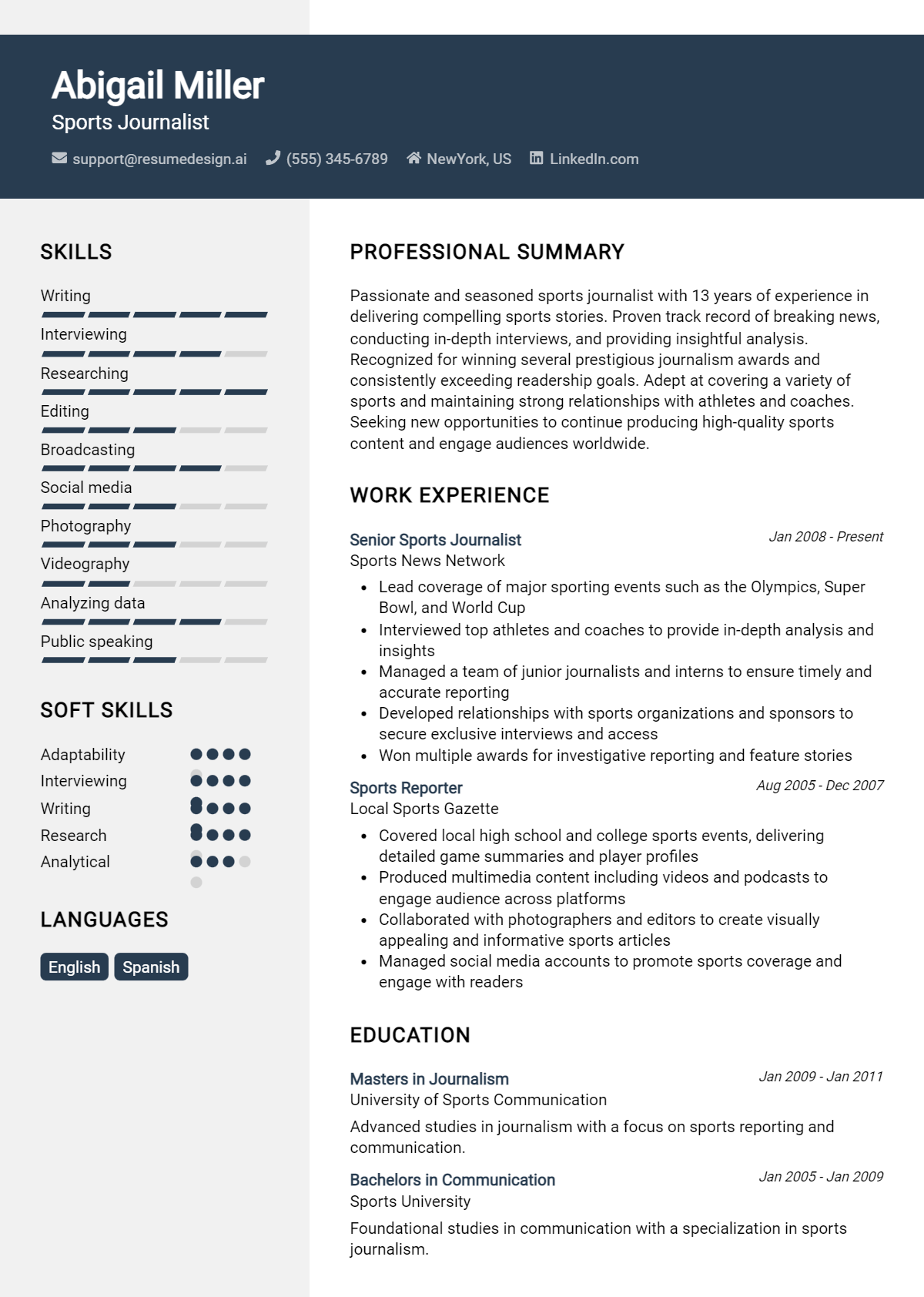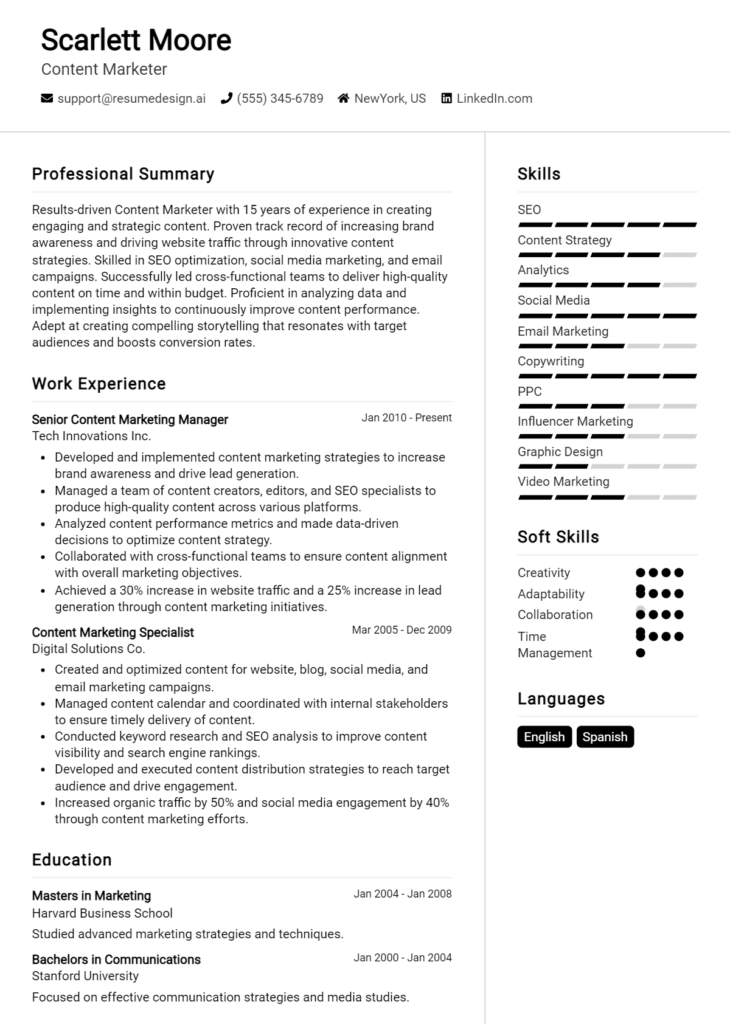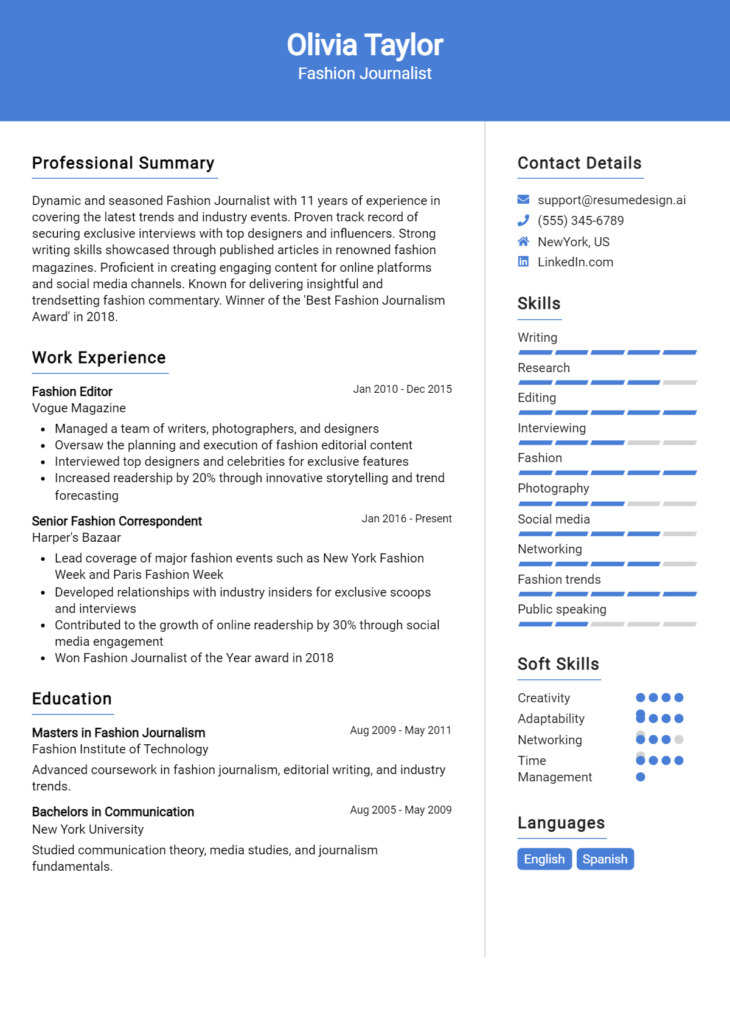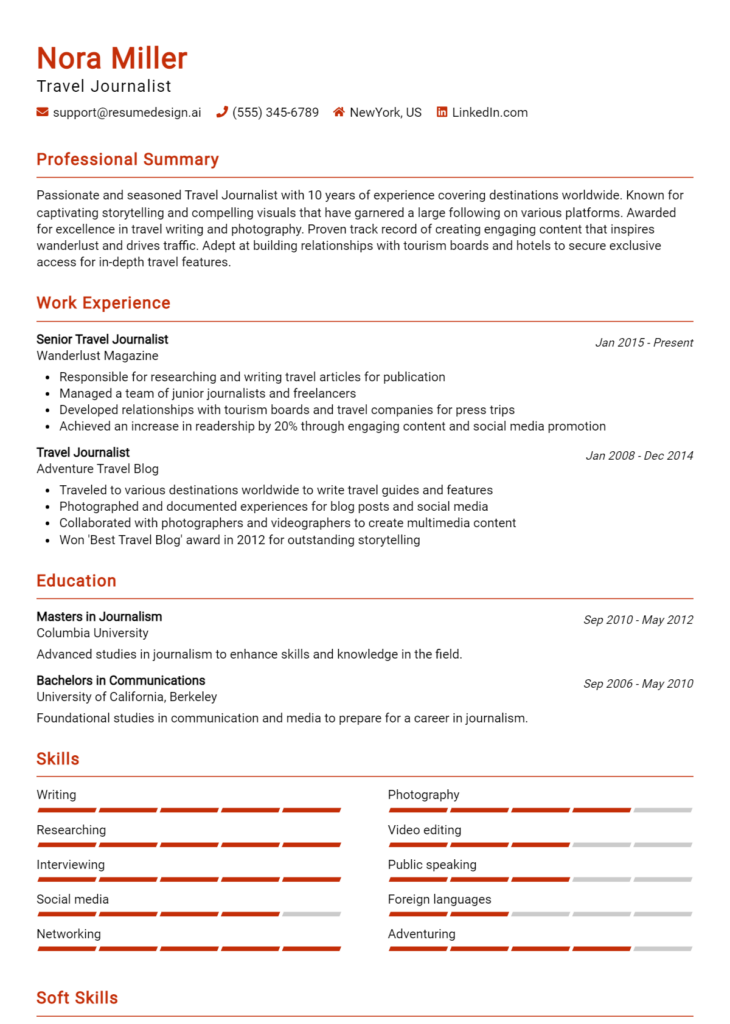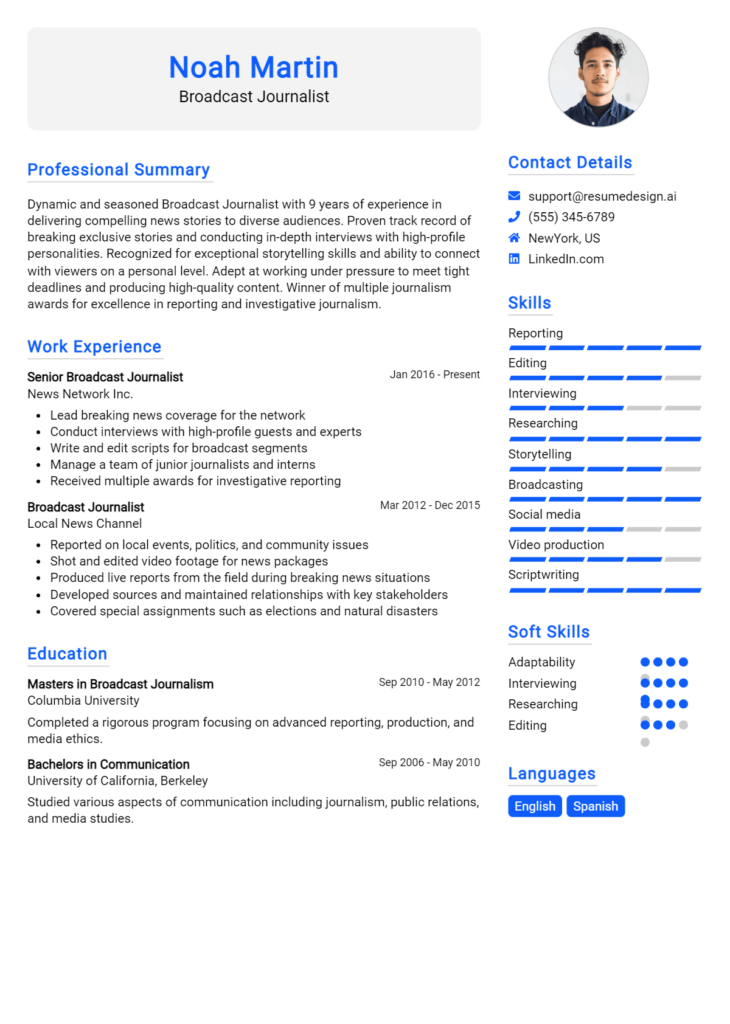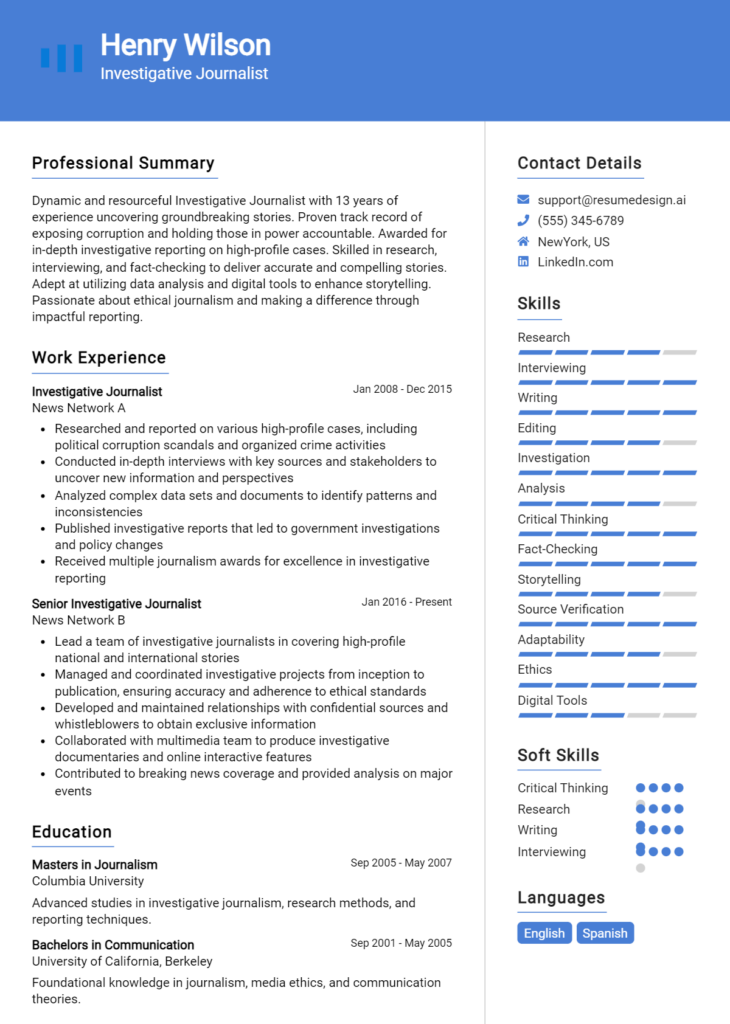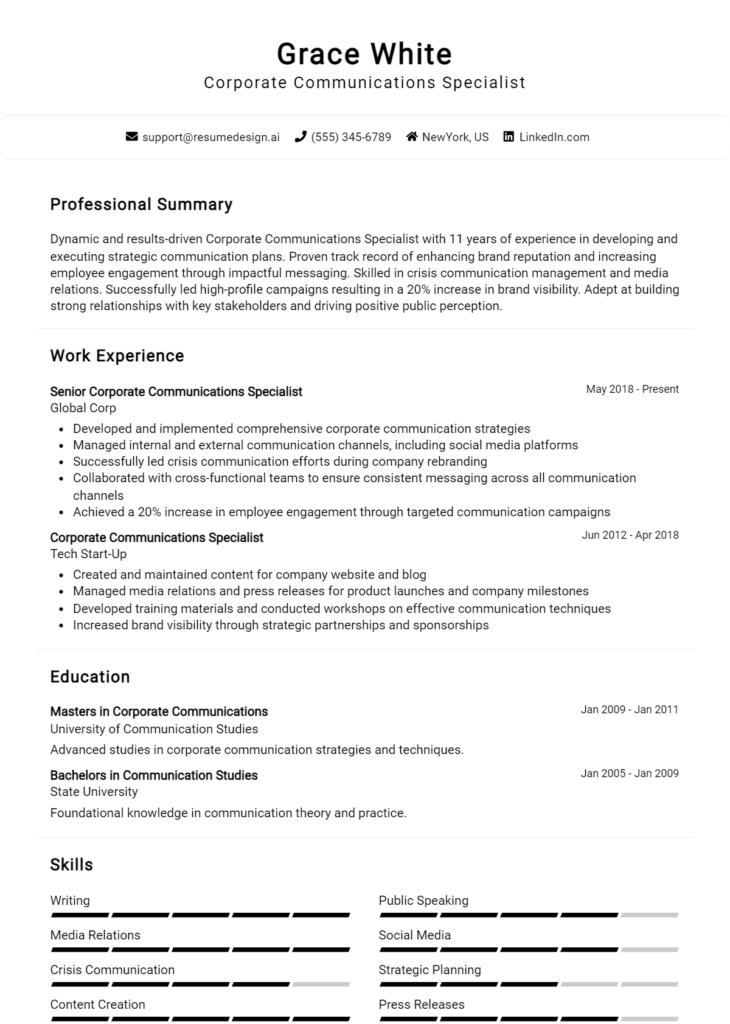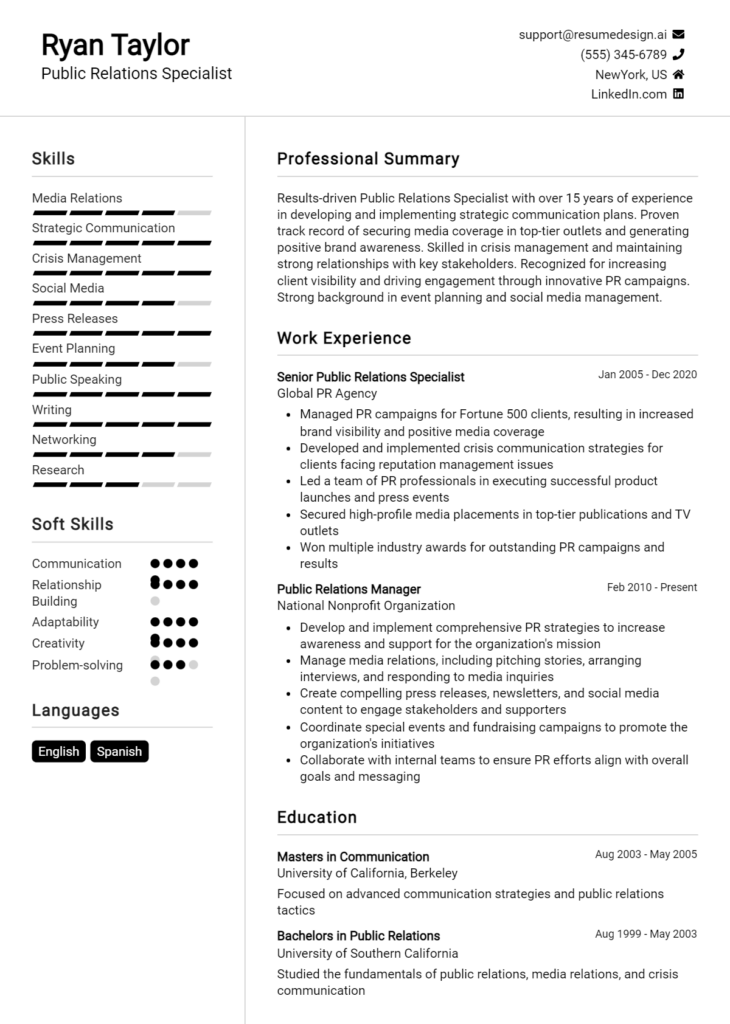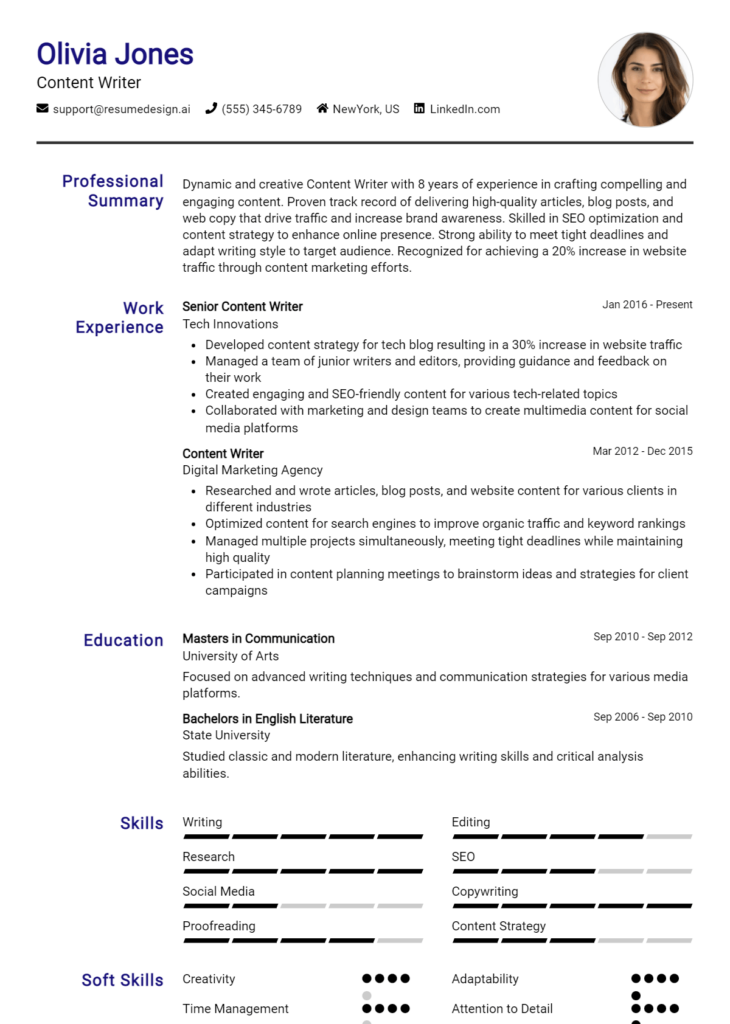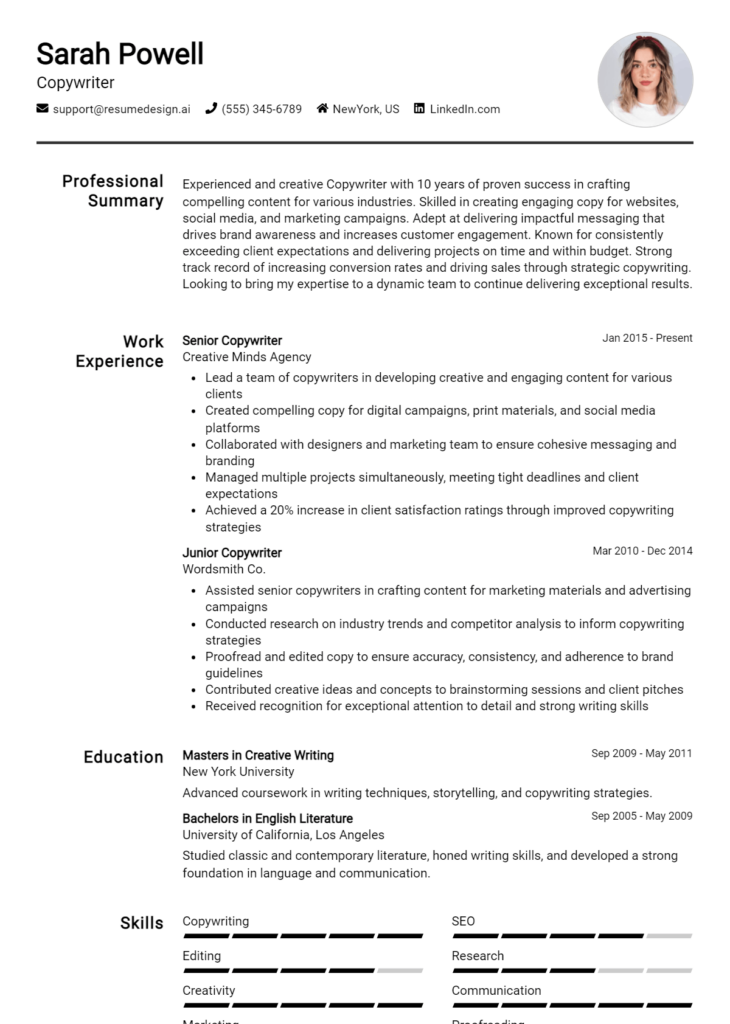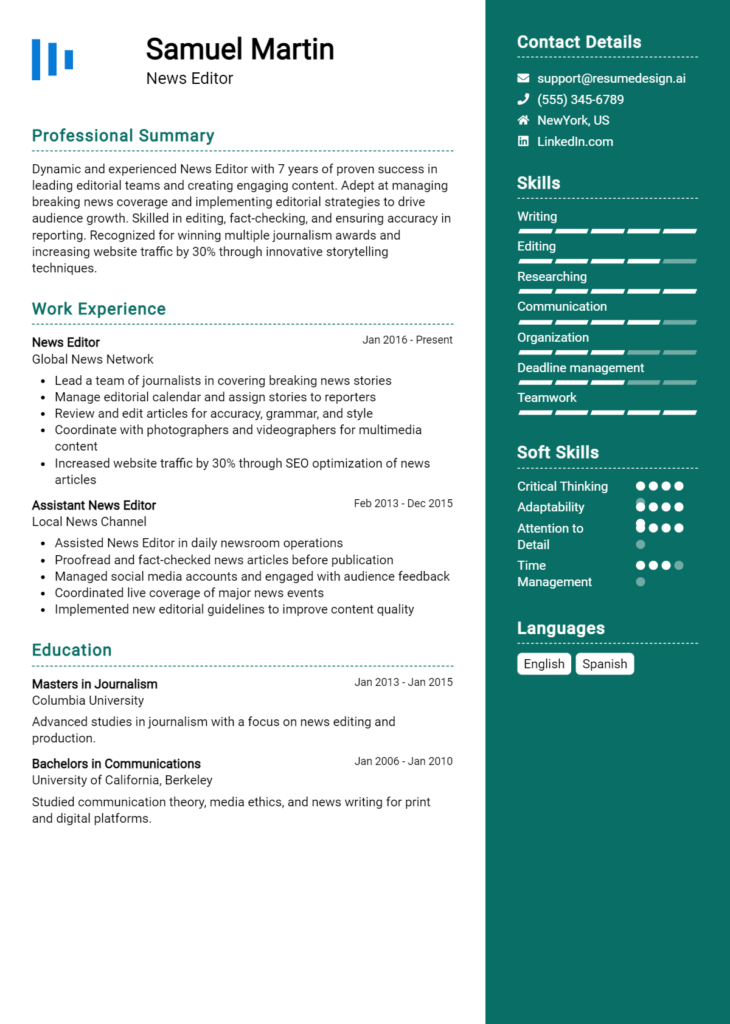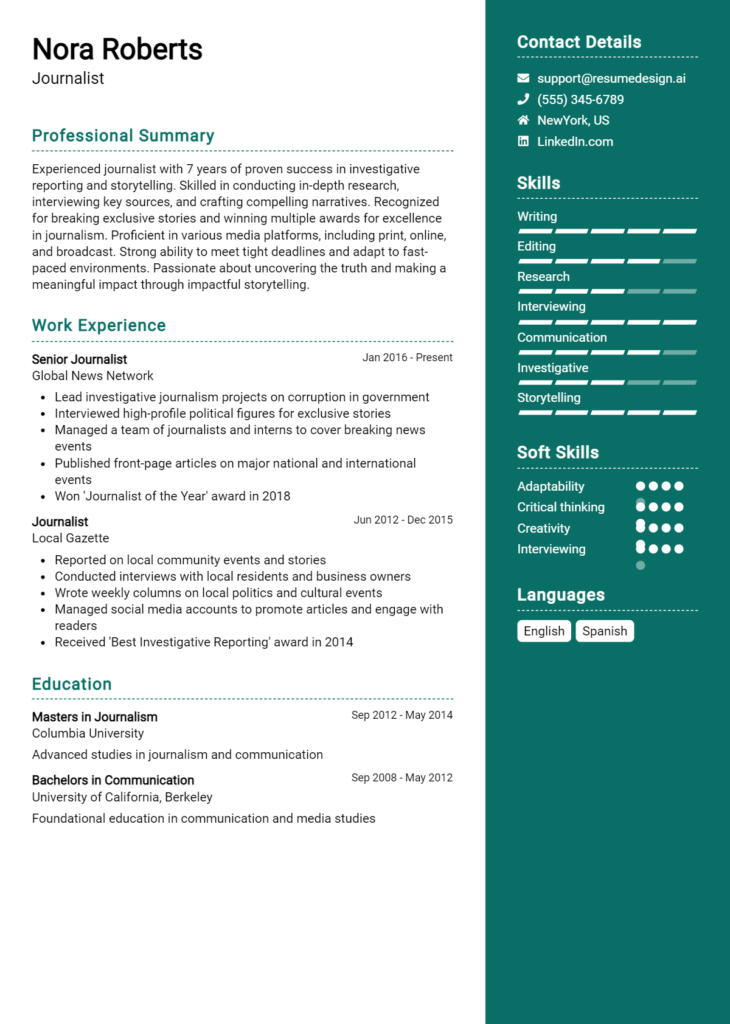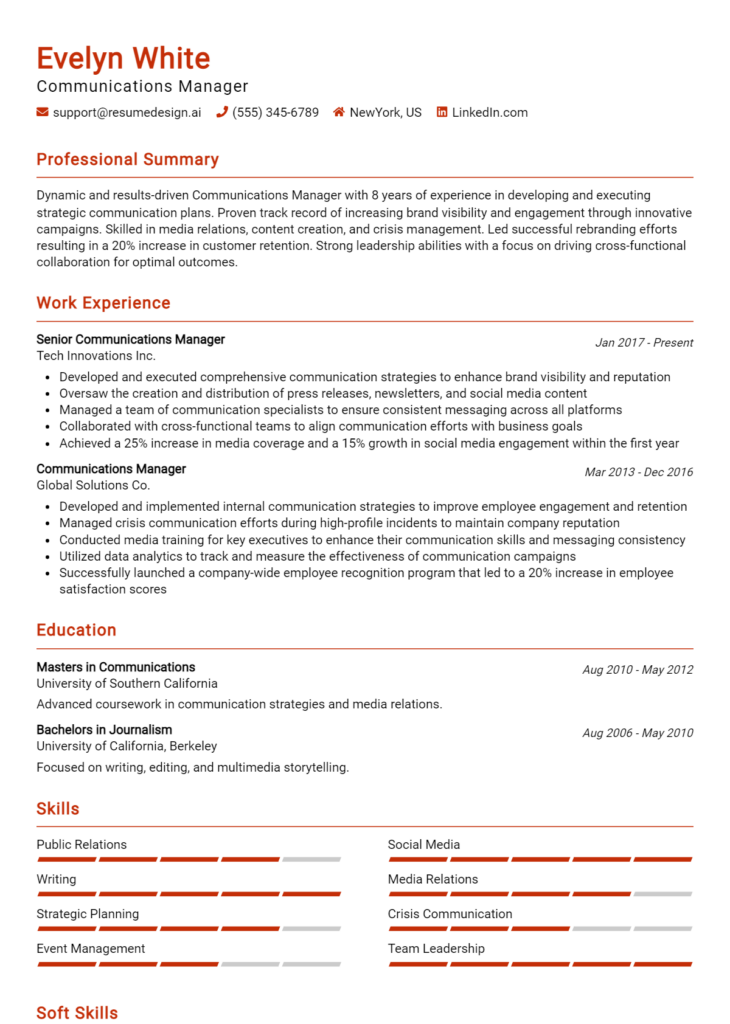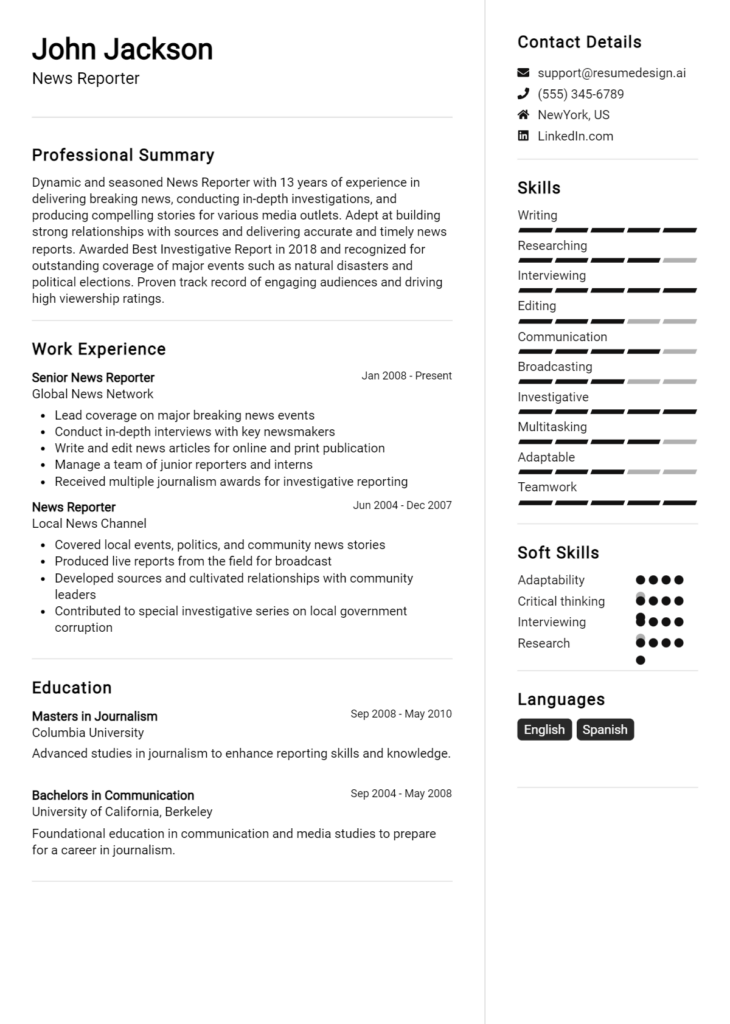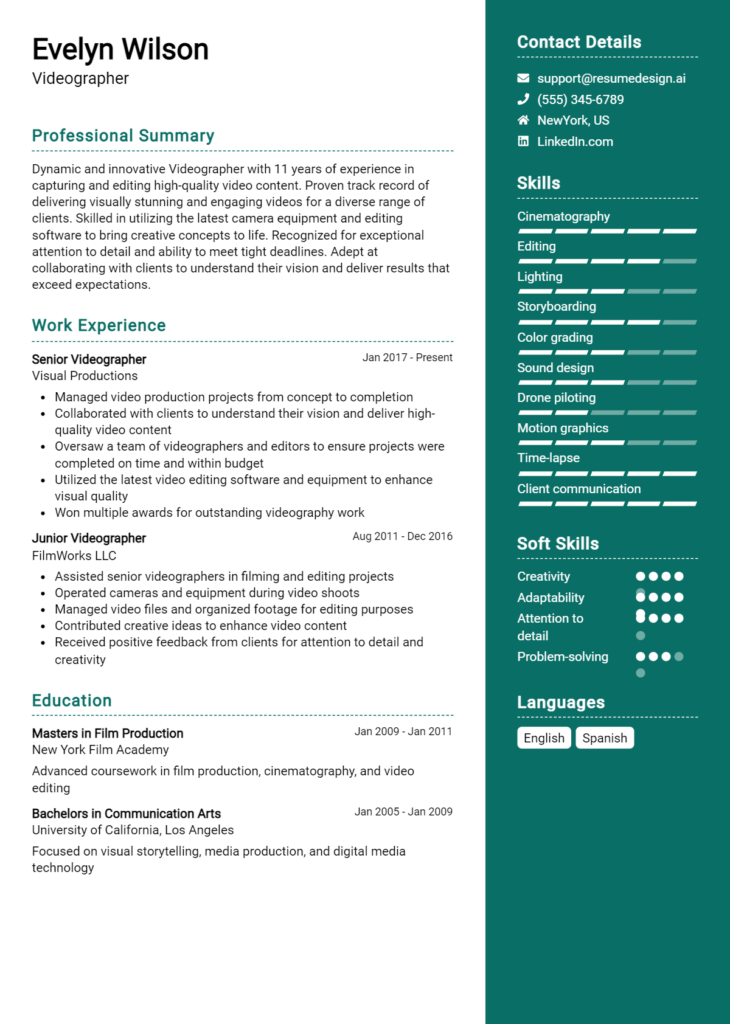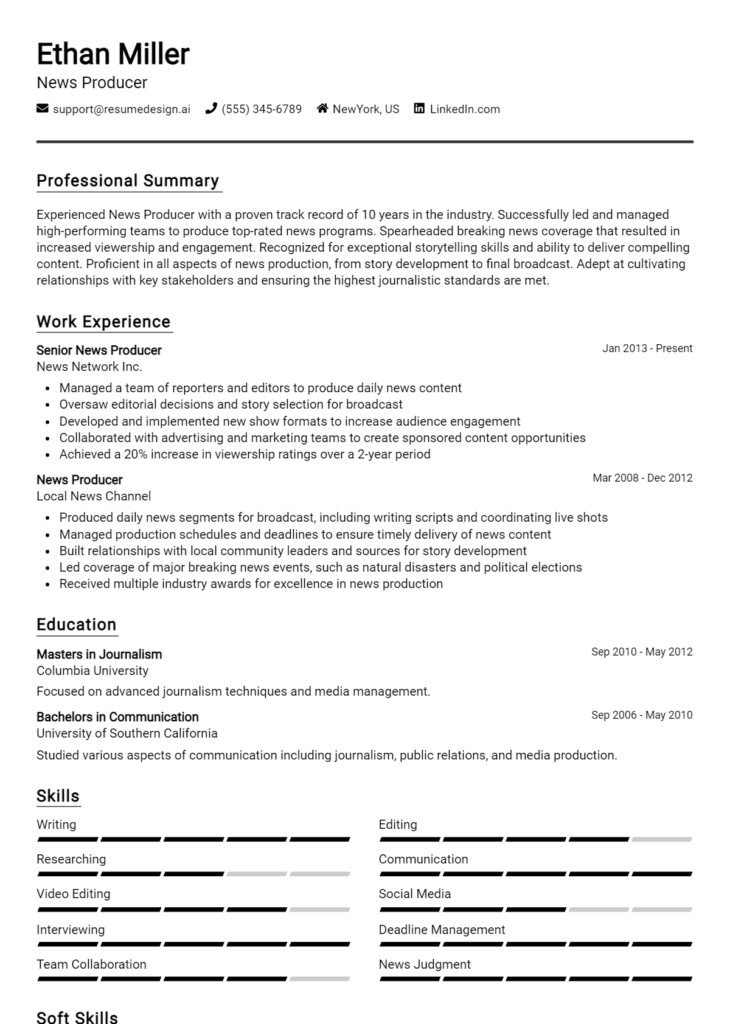Sports Journalist Core Responsibilities
A Sports Journalist plays a crucial role in the sports media landscape, encompassing responsibilities such as researching, writing, and reporting on various sporting events. They must possess strong technical skills for data analysis, operational abilities for managing deadlines, and problem-solving skills to navigate dynamic environments. This role often bridges editorial, marketing, and public relations departments, making collaboration essential. A well-structured resume highlighting these competencies can significantly enhance an applicant's prospects, aligning with the organization's objectives.
Common Responsibilities Listed on Sports Journalist Resume
- Conducting interviews with athletes, coaches, and sports officials
- Researching and writing articles, blogs, and reports on sports events
- Covering live sports events and providing real-time updates
- Creating engaging multimedia content, including videos and podcasts
- Analyzing game statistics and player performance
- Collaborating with editors and producers to refine content
- Maintaining up-to-date knowledge of sports trends and news
- Building and nurturing relationships with sports organizations and stakeholders
- Utilizing social media to promote stories and engage with the audience
- Fact-checking information to ensure accuracy and credibility
- Participating in press conferences and media day events
- Developing story ideas and pitching them to editorial teams
High-Level Resume Tips for Sports Journalist Professionals
In the competitive world of sports journalism, a well-crafted resume serves as your ticket to making a strong first impression on potential employers. It’s not just a list of your past jobs; it’s a reflection of your skills, achievements, and passion for sports reporting. A compelling resume should capture your unique voice and demonstrate your ability to engage audiences with insightful and accurate coverage. This guide will provide practical and actionable resume tips specifically tailored for Sports Journalist professionals, helping you stand out in this fast-paced industry.
Top Resume Tips for Sports Journalist Professionals
- Tailor your resume to the specific job description, using keywords from the posting to highlight your relevant skills and experiences.
- Showcase relevant experience by prioritizing internships, freelance work, or part-time roles that demonstrate your ability to write and report on sports.
- Quantify your achievements with specific metrics, such as the number of articles published, audience reach, or social media engagement.
- Highlight industry-specific skills, such as proficiency in sports analytics, multimedia content creation, or knowledge of digital media platforms.
- Include a portfolio link to showcase your best work, providing samples of articles, videos, or podcasts that illustrate your journalistic style.
- Use a clean, accessible format that makes it easy for hiring managers to skim your resume quickly for key information.
- Incorporate relevant education, including degrees in journalism or communications, and any specialized training related to sports reporting.
- Consider adding a section for professional affiliations, such as memberships in journalism associations or attendance at sports media conferences.
- Keep your resume concise, ideally one page, focusing on the most impactful information to hold the attention of busy hiring managers.
By implementing these tips, you can significantly increase your chances of landing a job in the Sports Journalist field. A polished resume that effectively showcases your talents and achievements will help you stand out in a crowded applicant pool, making it easier for employers to see your potential and fit for their team.
Why Resume Headlines & Titles are Important for Sports Journalist
In the competitive field of sports journalism, a well-crafted resume headline or title serves as a critical first impression that can set a candidate apart from the crowd. A strong headline grabs the attention of hiring managers and succinctly summarizes the candidate's key qualifications in a single, impactful phrase. It should be concise, relevant, and directly related to the job being applied for, allowing recruiters to quickly identify the applicant's unique value proposition. A compelling headline not only reflects the candidate’s expertise but also conveys enthusiasm and professionalism, making it an essential element of a sports journalist's resume.
Best Practices for Crafting Resume Headlines for Sports Journalist
- Keep it concise: Aim for a headline that is brief yet informative, ideally no more than 10 words.
- Be role-specific: Tailor your headline to reflect the specific position you are applying for.
- Highlight key strengths: Focus on your most relevant skills or accomplishments that align with the job description.
- Use action-oriented language: Start with strong verbs or adjectives that convey confidence and expertise.
- Include quantifiable achievements: If possible, incorporate numbers or metrics to showcase your impact in previous roles.
- Stay relevant: Ensure that the headline reflects current industry trends and the specific needs of the employer.
- Maintain professionalism: Avoid using overly casual language or clichés that may undermine your credibility.
- Test for clarity: Make sure your headline clearly communicates your qualifications without ambiguity.
Example Resume Headlines for Sports Journalist
Strong Resume Headlines
"Award-Winning Sports Journalist Specializing in Investigative Reporting"
"Dynamic Sports Writer with 5 Years of Experience Covering Major Leagues"
“Passionate Sports Analyst with Proven Track Record in Data-Driven Reporting"
Weak Resume Headlines
“Journalist Looking for Work in Sports”
“Experienced Writer”
The strong headlines are effective because they provide specific information about the candidate's experience and skills, making them relevant and appealing to hiring managers. They highlight achievements and areas of expertise, immediately showcasing what the candidate brings to the table. In contrast, the weak headlines fail to impress as they are vague and generic, lacking the specificity and impact needed to capture attention. By not clearly articulating the candidate’s qualifications or focus, these weak headlines miss the opportunity to stand out in a competitive job market.
Writing an Exceptional Sports Journalist Resume Summary
An exceptional resume summary is crucial for a Sports Journalist as it acts as the first impression on hiring managers reviewing applications. A well-crafted summary quickly captures attention by showcasing key skills, relevant experience, and notable accomplishments that align with the job role. It should be concise, impactful, and tailored specifically to the position being applied for, allowing candidates to stand out in a competitive field.
Best Practices for Writing a Sports Journalist Resume Summary
- Quantify achievements: Use numbers to demonstrate your impact, such as audience growth or articles published.
- Focus on relevant skills: Highlight skills directly related to sports journalism, such as interviewing, reporting, and multimedia storytelling.
- Tailor for the job description: Customize your summary to align with the specific requirements and responsibilities outlined in the job posting.
- Use active language: Start sentences with powerful action verbs to convey confidence and competence.
- Keep it concise: Aim for 3-5 sentences that deliver maximum information effectively without overwhelming the reader.
- Showcase unique achievements: Mention any awards, recognitions, or unique experiences that differentiate you from other candidates.
- Incorporate keywords: Use industry-specific terminology and keywords from the job description to pass applicant tracking systems.
- Maintain professionalism: Ensure that the tone is formal yet engaging, reflecting the standards of the journalism industry.
Example Sports Journalist Resume Summaries
Strong Resume Summaries
Dynamic Sports Journalist with over 5 years of experience covering major league events, resulting in a 25% increase in readership for online publications. Adept at developing engaging content across multiple platforms and proficient in multimedia storytelling.
Award-winning Sports Reporter with a proven track record of breaking news and delivering in-depth analysis. Successfully conducted over 100 interviews with athletes and coaches, enhancing audience engagement by 40% in the last year.
Passionate Sports Journalist skilled in live reporting and social media engagement. Increased Twitter following by 150% within six months through strategic content creation and interaction with fans. Experienced in video editing and podcast production.
Weak Resume Summaries
I am a sports journalist looking for a new opportunity. I have written articles and covered events in the past.
Enthusiastic about sports and writing. I have experience in journalism and would like to work in sports media.
The examples provided illustrate the difference between strong and weak resume summaries. The strong summaries are specific, quantifiable, and highlight relevant skills and achievements that directly relate to the sports journalism role. In contrast, the weak summaries are vague, lack details, and do not showcase any measurable outcomes or unique qualifications, making them less compelling to hiring managers.
Work Experience Section for Sports Journalist Resume
The work experience section of a Sports Journalist resume is critical as it showcases not just the candidate's technical skills in journalism, but also their ability to manage teams and deliver high-quality content under tight deadlines. This section provides prospective employers with insight into how a candidate has applied their expertise in real-world scenarios, highlighting their contributions to successful projects. Quantifying achievements—such as the number of articles produced, audience engagement metrics, or awards won—helps to paint a clearer picture of a candidate's capabilities. Aligning work experience with industry standards is essential as it demonstrates an understanding of the expectations in the field of sports journalism.
Best Practices for Sports Journalist Work Experience
- Highlight specific technical skills relevant to sports journalism, such as multimedia reporting, data journalism, or social media engagement.
- Quantify achievements by using metrics, such as increased readership or audience engagement rates.
- Emphasize collaboration by indicating roles in team projects or cross-departmental initiatives.
- Tailor work experience descriptions to align with industry standards and job descriptions.
- Showcase leadership roles, such as managing editorial teams or mentoring junior journalists.
- Include relevant freelance or volunteer work that demonstrates commitment and versatility.
- Use active language to convey impact, such as "led," "developed," or "produced."
- Focus on recent experiences that demonstrate current skills and trends in sports journalism.
Example Work Experiences for Sports Journalist
Strong Experiences
- Produced over 150 articles covering major sporting events, resulting in a 30% increase in website traffic within six months.
- Led a team of five reporters in the coverage of the national championship, achieving an audience engagement rate of 45% on social media platforms.
- Developed a multimedia series on local athletes, which won the Best Sports Feature award at the annual journalism competition.
- Collaborated with the marketing department to launch a newsletter that increased subscriber numbers by 25% in one year.
Weak Experiences
- Wrote articles about sports.
- Worked with the team on various projects.
- Covered some games and events.
- Participated in meetings to discuss sports topics.
The examples of strong experiences are considered effective because they provide specific details about achievements, quantify results, and demonstrate leadership and collaboration. They clearly highlight the candidate's contributions and the impact of their work. In contrast, the weak experiences lack specificity and measurable outcomes, making them less compelling to potential employers. They do not convey the candidate's true capabilities or the value they could bring to an organization.
Education and Certifications Section for Sports Journalist Resume
The education and certifications section of a Sports Journalist resume is crucial as it serves to showcase the candidate's academic background and relevant qualifications that are essential for success in the field. This section not only highlights degrees and certifications but also reflects the candidate's commitment to continuous learning and professional development. By including relevant coursework and specialized training, candidates can significantly enhance their credibility and demonstrate their alignment with the specific requirements of the sports journalism role, making them stand out to potential employers.
Best Practices for Sports Journalist Education and Certifications
- Include only relevant degrees and certifications that pertain to journalism or sports media.
- Highlight specific coursework that demonstrates expertise in sports reporting, media ethics, or broadcasting.
- List industry-recognized certifications, such as those from journalism associations or media training programs.
- Keep descriptions concise but informative—focus on achievements and skills gained.
- Order information chronologically, starting with the most recent qualifications.
- Consider including ongoing education, such as workshops or online courses related to sports journalism.
- Tailor the section for each application to emphasize the most relevant credentials for the job.
- Use clear formatting to enhance readability and make important details stand out.
Example Education and Certifications for Sports Journalist
Strong Examples
- Bachelor of Arts in Journalism, University of Sports Media, Graduated May 2021
- Certified Sports Journalist, National Association of Sports Writers, Completed 2022
- Advanced Reporting Techniques for Sports, Online Course, Completed 2023
- Internship in Sports Reporting, Major City Newspaper, Summer 2020
Weak Examples
- Bachelor of Arts in History, University of Arts, Graduated May 2018
- Certificate in Basic Photography, Local Community College, Completed 2019
- High School Diploma, Graduated 2015
- Online Course in Cooking, Completed 2021
The strong examples are considered effective as they directly relate to the skills and knowledge required for a career in sports journalism, showcasing relevant degrees and certifications that enhance the candidate's qualifications. In contrast, the weak examples fail to connect with the field of sports journalism, featuring outdated or irrelevant credentials that do not contribute to the candidate's expertise or appeal for the desired role.
Top Skills & Keywords for Sports Journalist Resume
In the competitive field of sports journalism, possessing the right skills is essential for crafting a compelling resume that stands out to employers. A well-rounded skill set not only showcases a journalist's ability to report accurately and engagingly but also highlights their adaptability in a fast-paced and ever-evolving industry. By emphasizing both hard and soft skills, a sports journalist can effectively demonstrate their capability to cover diverse sporting events, connect with audiences, and navigate the digital landscape of modern media. Understanding which skills to prioritize can significantly enhance your resume and increase your chances of landing that dream job.
Top Hard & Soft Skills for Sports Journalist
Soft Skills
- Excellent Communication
- Strong Storytelling Ability
- Critical Thinking
- Adaptability
- Time Management
- Interpersonal Skills
- Team Collaboration
- Attention to Detail
- Creativity
- Resilience
- Analytical Thinking
- Networking Skills
- Empathy
- Problem-Solving
- Negotiation Skills
Hard Skills
- News Writing
- Editing and Proofreading
- Research Proficiency
- Social Media Management
- Multimedia Production
- Data Analysis
- SEO Knowledge
- Interviewing Techniques
- Understanding of AP Style
- Photography and Videography Skills
- Knowledge of Sports Analytics
- Broadcast Journalism Techniques
- Audio Editing
- Content Management Systems (CMS)
- Familiarity with Blogging Platforms
- Statistical Reporting
- Experience with Graphic Design Software
By including a robust combination of these skills on your resume, you can effectively convey your qualifications and experiences to potential employers, making a strong case for your candidacy in the dynamic world of sports journalism. Additionally, showcasing relevant work experience will further solidify your position as a capable and versatile sports journalist.
Stand Out with a Winning Sports Journalist Cover Letter
I am writing to express my interest in the Sports Journalist position at [Company Name], as advertised on [where you found the job posting]. With a Bachelor’s degree in Sports Communication and over five years of experience covering a wide range of sporting events, I am excited about the opportunity to contribute to your team. My passion for sports, combined with my strong writing skills and ability to engage with audiences, makes me a perfect fit for this role.
Throughout my career, I have honed my ability to deliver compelling narratives while providing in-depth analysis of games, players, and relevant industry developments. At [Previous Company Name], I covered major events such as the [specific event or league], where my articles not only captured the excitement of the moment but also provided a thoughtful perspective on the implications for teams and fans alike. I am adept at using various multimedia platforms to enhance my storytelling, utilizing social media to engage with audiences and promote my work.
What sets me apart is my commitment to accuracy and integrity in sports journalism. I believe that trust is paramount when it comes to reporting on the events and figures that inspire passion in so many. My experience working in fast-paced environments has equipped me with the ability to meet tight deadlines while maintaining the highest editorial standards. I am eager to bring my unique voice and perspective to [Company Name] and collaborate with your talented team to deliver high-quality sports content that resonates with your audience.
Thank you for considering my application. I look forward to the opportunity to discuss how my background, skills, and enthusiasm for sports journalism can contribute to the success of [Company Name]. Please feel free to contact me at your earliest convenience to schedule a conversation.
Common Mistakes to Avoid in a Sports Journalist Resume
As a sports journalist, your resume serves as your first impression in a competitive field. Crafting a winning resume requires attention to detail and an understanding of what hiring managers are looking for. Unfortunately, many candidates make common mistakes that can hinder their chances of landing an interview. Here are some pitfalls to avoid when creating your sports journalist resume:
Lack of Tailoring: Submitting a generic resume that isn't customized for the specific job can signal a lack of interest and effort. Make sure to highlight relevant experiences and skills that align with the job description.
Overly Complex Language: Using jargon or overly complex language may alienate readers. Aim for clear and concise language that communicates your experience effectively.
Ignoring Keywords: Many employers use applicant tracking systems (ATS) to filter resumes. Failing to include relevant keywords from the job listing can result in your resume being overlooked.
Inconsistent Formatting: A disorganized layout with varying fonts, sizes, and styles can make your resume difficult to read. Stick to a clean, professional format for consistency and ease of reading.
Neglecting Soft Skills: While technical skills are crucial, it’s important to highlight soft skills such as communication, teamwork, and adaptability, which are essential in journalism.
Omitting Relevant Experience: Some candidates overlook freelance work, internships, or volunteer positions that showcase their reporting skills. Include all relevant experiences, even if they were unpaid.
Excessive Length: A resume that exceeds one page may deter busy hiring managers from reading it. Focus on your most relevant experiences and keep it concise.
Poor Proofreading: Spelling and grammatical errors can undermine your professionalism. Always proofread your resume multiple times and consider having a peer review it as well.
Conclusion
As we wrap up our exploration of the essential skills and qualifications required for a successful career as a sports journalist, it's clear that a strong foundation in both writing and sports knowledge is crucial. We discussed the importance of effective communication, the ability to think critically under pressure, and the need for adaptability in a fast-paced environment. Additionally, networking and staying updated with the latest trends in sports media are vital for professional growth.
Now that you've gained insights into what it takes to excel in this exciting field, it's time to reflect on your own credentials. Take a moment to review your sports journalist resume to ensure it showcases your skills and experiences effectively.
To assist you in this process, consider utilizing the following resources:
- Explore resume templates tailored for sports journalists to help structure your achievements professionally.
- Use the resume builder for a step-by-step guide to creating a standout resume.
- Check out resume examples for inspiration and ideas to enhance your own document.
- Don’t forget the importance of a compelling introduction with cover letter templates that can help you make a strong first impression.
Take charge of your career today by refining your resume and positioning yourself as a competitive candidate in the world of sports journalism!

